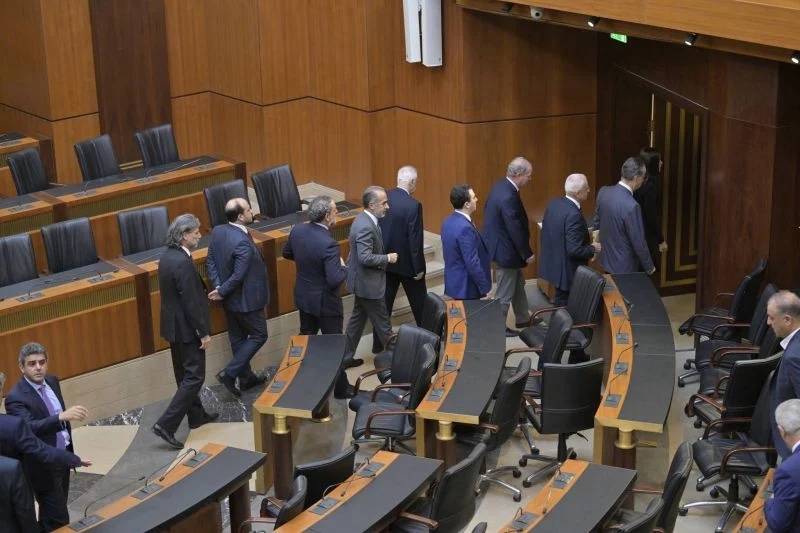
Lebanese Forces MPs leave Parliament after the postponement of an electoral session, due to lack of quorum, on Oct. 13, 2022. (Credit: An-Nahar)
Last October, the American Task Force on Lebanon sponsored a bipartisan Congressional staff delegation to Lebanon. While there, we warned Lebanon’s political leaders that it would not reflect well on their leadership if there was no president and no IMF deal by the time of our next visit. As our delegation of civic and business leaders from the Lebanese-American community embarks on this visit, we note with regret that Lebanon’s political leaders have so far failed to make meaningful progress on either of these issues.
There is no good reason why Parliament has failed to elect a president or form a government for over four months
Eleven rounds of voting for president with no victor is frustrating. The current lack of quorum in Parliament to hold any votes is obstructive. We support the recommendation of senators Bob Menendez (D-NJ) and Jim Risch (R-ID), chair and ranking member of the Senate Foreign Relations Committee, that the Biden Administration use “all available leverage” against those obstructing the presidential election and government formation process.
The senators directed their frustration at Parliament Speaker Nabih Berri as well as members of Parliament affiliated with the Amal Movement, Hezbollah and the Free Patriotic Movement for delaying the necessary parliamentary procedures required to elect a president.
Our delegation will be meeting with Speaker Berri and other key government officials to strongly urge them to facilitate the election of Lebanon’s next president in a timely manner and relay what we see as US expectations in this regard.
We are also mindful of the fact that 46 MPs have announced they will boycott future legislative sessions of Parliament, citing the Lebanese constitution’s provision that absent a president, Parliament is an electoral body and not a legislature. While it is encouraging to see so many parliamentarians elected as oppositionists, reformists and independents come together on this boycott, it is disappointing such a coalition has not yet come together on the election of Lebanon’s next president. They need to put aside parochial interests and compromise on electing a clean, competent and reform-oriented president who will respond to what the citizens of Lebanon have been demanding for far too long.
We will also meet with key political leaders who are able to lead a consensus-building process to elect a president. Since last May’s parliamentary election results, everyone has known there would need to be a political consensus among parliamentarians in electing Lebanon’s next president and forming a government. There should be no more excuses.
The IMF staff level agreement is Lebanon’s only economic lifeline
Senators Menendez and Risch have not stopped at highlighting obstruction by Lebanon’s elected leaders. We also stand by their call to sanction Lebanon’s financial and political elite who are obstructing needed economic reforms.
The staff level agreement between the IMF and the Lebanese government was reached almost a year ago. In their most recent visit to the country, the IMF referred to Lebanon’s progress in implementing reforms outlined in the agreement as “very slow.”
US officials and the Lebanese American community praised the deal, and called on Lebanon’s leaders to quickly implement the reforms it mandated, to no avail.
Some of the key reforms Lebanese lawmakers have failed to implement include: reducing public expenditures, formalizing a capital control law, concluding a realistic 2023 budget and restructuring the banking sector to protect the entire savings of small depositors.
When we were in Lebanon last October, we were surprised that many of our Lebanese counterparts felt they had “satisfied” the international community through the maritime deal with Israel and that the IMF reforms were unnecessary. We will tell them now what we told them then: there is no substitute or alternative to the IMF agreement.
There are, however, ways in which the IMF can improve its outreach to the caretaker government, parliamentarians and the public, and in which those groups can better communicate with one another. Members of the International Support Group should empower an independent and trusted facilitator who can speak to the public directly on the importance of IMF reforms and facilitate a consensus building dialogue with parliamentarians and government officials to agree on a common economic program for the future of the country.
This should have been done yesterday. The Lebanese people are suffering and their currency’s value continues to deteriorate by the day and still there is no roadmap on how to move reform proposals forward.
Talk is cheap, we expect results
There are a number of other reforms Lebanon’s elected leaders need to implement to both strengthen their democracy and improve the quality of life for the people they are elected to represent. These include strengthening judicial independence and supplying electricity to the Lebanese people, two issues which can be addressed in the matter of a few months if corrupt politicians would put the people’s needs ahead of their own personal interests.
For nearly a year we’ve heard a lot of excuses for why Lebanon’s leaders have not implemented IMF reforms nor taken action on electing a president. The Lebanese American community, and indeed the entire Lebanese diaspora, expect Lebanon’s leaders to take actions that benefit the Lebanese people, not more of the same excuses. Our families and friends have suffered for far too long and for no good reason, and we will voice their frustrations and demands to Lebanon’s leaders during our trip.
Edward M. Gabriel is president of the American Task Force on Lebanon, a leadership organization of Americans of Lebanese descent, and former US ambassador to Morocco.